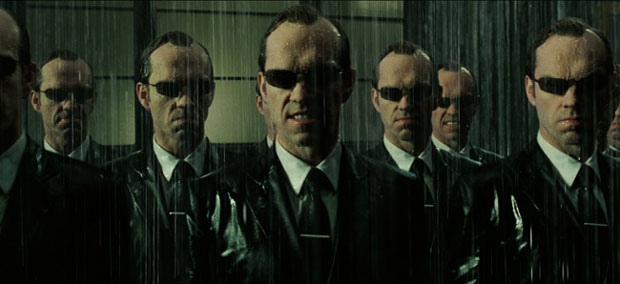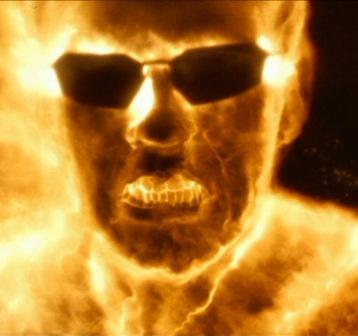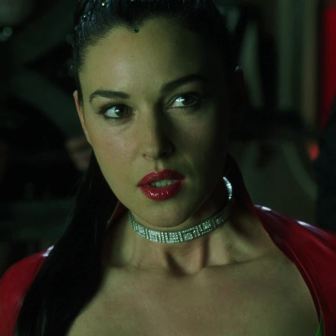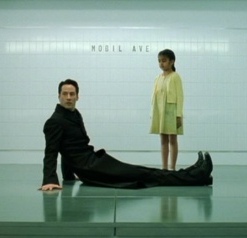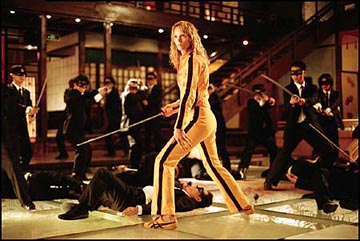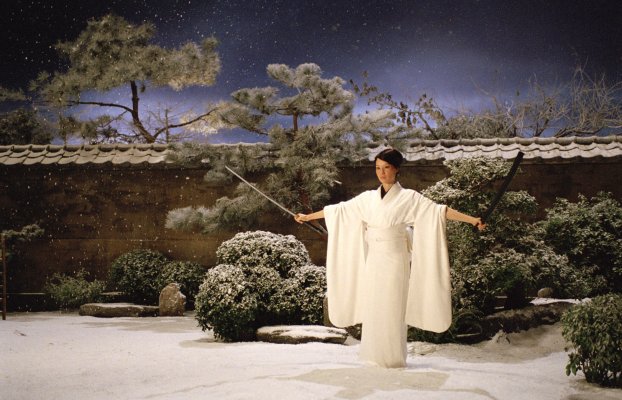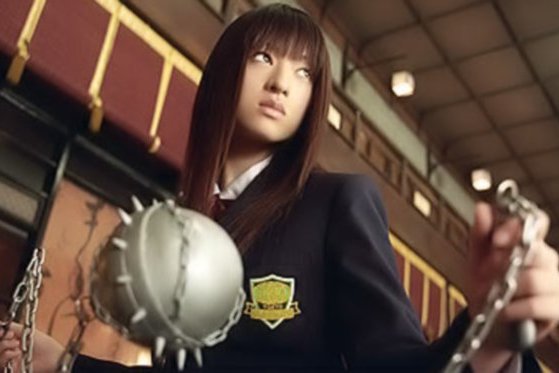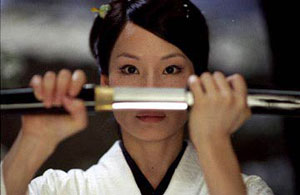It is close now, so close to achieving its goal. (Yes, my count is a day ahead of most people’s, but I’m going at midnight tomorrow night, and for me that’s Tuesday.) A lot of the US press hasn’t weighed in yet, but as they do, check below. Update: One last scratchy, bad-quality clip, precious? Faramir runs into a spot of trouble. To be honest, the resolution’s so bad here that it’s almost not worth watching, but if you really need a fix… [9, 8, 7, 6, 5, 4, 3, 2]
New York Film Critics Circle: Best Film of 2003.
Rotten Tomatoes: 98% (156-4)
Metacritic: 94% (40)
New York Times: “After the galloping intelligence displayed in the first two parts of ‘The Lord of the Rings’ trilogy, your fear may be that the director, Peter Jackson, would become cautious and unimaginative with the last episode…But Mr. Jackson crushes any such fear. His ‘King’ is a meticulous and prodigious vision made by a director who was not hamstrung by heavy use of computer special-effects imagery.”
New York Post: “‘The Lord of the Rings: The Return of the King’ rules as the crowning achievement of Peter Jackson’s awesome adaptation of J.R.R. Tolkien’s trilogy, a majestic conclusion to a nine-plus-hours epic that stirs the heart, mind and soul as few films ever have…it’s also one of the most beautiful films ever shot.“
New York Daily News: “With ‘The Return of the King,’ New Zealand director Peter Jackson has completed his trilogy of J.R.R. Tolkien’s mammoth ‘The Lord of the Rings,’ and can lay claim to one of the greatest achievements in film history. Taken as a whole, ‘The Lord of the Rings’ is the first masterpiece of the 21st century.”
Chicago Tribune: “One ‘Ring’ – finally – rules them all. In ‘The Lord of the Rings: The Return of the King,’ a great mythic movie cycle gets the ending it deserves – and we can finally see this stunningly completed film trilogy for what it is: one of the major achievements of film history.”
LA Times: “It took one ring to rule them all, and now there’s one film to end it all, to bring to a close the cinematic epic of our time, the one by which all others will be judged…As a model for how to bring substance, authenticity and insight to the biggest of adventure yarns, this trilogy will not soon, if ever, find its equal.”
Washington Post: “one thing Jackson does brilliantly is capture the exhilaration, fatigue, heroism and despair of war. He looks at it as something not ennobling but exhausting, more ordeal than crusade but — completely necessary…’The Return of the King’ puts you there at Waterloo, or Thermopylae or the Bulge, any desperate place where men ran low on blood and iron and ammo, but not on courage.“
Boston Globe: “‘The Lord of the Rings: The Return of the King’ delivers on all the mighty expectations Peter Jackson created in ‘The Fellowship of the Ring’ and ‘The Two Towers.’…[It] unfurls with the sprawling pageantry of the first two installments, movies in which Jackson reclaimed the fantasy epic as a source of headlong astonishment.“
USA Today: “****….As good as each individual movie is, the third film vaults the work into the stratosphere of classic movies. Key characters are enhanced, new civilizations visited and battles fought more intensely, while feelings and motivations are plumbed more deeply and movingly…In its entirety, The Lord of the Rings surpasses other multi-part sagas such as Star Wars or even The Godfather.“
San Jose Mercury Tribune: “‘Return of the King’ combines the best moments of ‘Fellowship’ and ‘Two Towers’ and brings the Arthurian trilogy to a rousing, satisfying finish. Taken alone, it’s a great movie. In conjunction with the other installments, it’s a historic movie event, one that the Academy Awards will have to work hard to ignore when doling out this year’s top honors.“
Atlanta Journal-Constitution: “With ‘The Lord of the Rings: The Return of the King,’ Peter Jackson brings his epic series to a glorious finish. And in doing so, he’s made the greatest movie trilogy in cinema history…Peter Jackson has taken us there and back again. And he’s done it with a masterwork that truly is the one trilogy to rule them all.“
Village Voice: “The most hallucinatory of war films, The Return of the King concludes the Lord of the Rings trilogy with a burst of smoky grandeur…Peter Jackson’s hobbit epic is certainly the greatest feat of pop movie magic since Titanic.“
Slate: “This is the best of the three Rings movies�more than that, it makes the others look even better. You can finally see the arc of the trilogy: not just J.R.R. Tolkien’s, with its blend of Norse and Christian myth, but Peter Jackson’s….The Lord of the Rings took seven years and an army of gifted artists to execute, and the striving of its makers is in every splendid frame. It’s more than a movie�it’s a gift.“
San Francisco Chronicle: “With the possible exception of the Russian ‘War and Peace,’ such a combination of monetary resources, creative talent and technical mastery has never been brought to bear on a movie project, and nothing on this scale is likely to occur again soon….the movie reaches us with special recognition, even as it reaches both behind us and past us, with the universality of a classic. It is the old story, the timeless thing. The human struggle, made noble.“
CNN: “This third in the series of the ‘Rings’ franchise is utterly breathtaking. Even J.R.R. Tolkien would be highly impressed…All in all, ‘The Lord of the Rings’ is the stuff that dreams are made of. “
Philadelphia Inquirer: “Peter Jackson’s The Lord of the Rings trilogy is, by any measure, a crowning moment in cinema history…It is an achievement of bewildering scale.“
Roger Ebert: “This is the best of the three, redeems the earlier meandering, and certifies the Ring trilogy as a work of bold ambition at a time of cinematic timidity…Jackson’s achievement cannot be denied. The Return of the King is such a crowning achievement, such a visionary use of all the tools of special effects, such a pure spectacle, that it can be enjoyed even by those who have not seen the first two films.“
Miami Herald: “****. With the spectacular The Return of the King, Peter Jackson’s Lord of the Rings film trilogy becomes the new benchmark against which all future fantasy movies must now be judged…The Return of the King feels like a miracle, a movie that exceeds even the most formidable expectations without straying from its singular path. All hail this King.
Charlotte Observer: “****. ‘Return’ is the equal of the magnificent opening episode, ‘The Fellowship of the Ring.’…[It] should convince even the most hardened skeptic that ‘The Lord of the Rings’ is one of the great achievements of film history…Jackson had the vision, persistence, insight and patience for this mighty job, plus the smarts to shape stage veterans and overlooked film actors into a seamless cast. He’s made himself as immortal as a movie director can be.“
Detroit Free Press: “So hail this ‘King.’ It not only stands as fantasy filmmaking on a peak of previously unscaled proportions, it now officially takes its place in the Great Hall of Movie Mythology, the place we return to again and again to share our dreams.“
Dallas Morning News: “But the trilogy’s real hero is Peter Jackson. The director and screenwriter brings unity to a somewhat unwieldy story and handles the spectacle scenes with flourish and coherence. The Return of the King is the best of the Tolkien-inspired cinema trinity. It’s got heart, soul and monsters.“
Baltimore Sun: “[A]s the final chapter of, essentially, a single 10-hour movie, [RotK] has a narrative beauty and a sublime ensemble performance that put it in a class by itself…The Lord of the Rings: The Return of the King is so replete with imagistic and literary treasures that it repays re-viewing. After seeing it, I felt as I did after seeing E.T. – that unless the distributor wants to pull it back, there’s no reason for it ever to stop running.“
Salon: “With ‘The Return of the King,’ Jackson, his remarkable cast and his enormous ensemble of collaborators have found victory at the end of their improbable quest…Packed with passion and heroism, the grimness of death and the hope of salvation, this final chapter flies past with the speed of Shadowfax…None of us is ever again likely to encounter a 200-minute movie we are so reluctant to see come to an end…this one is Jackson’s crowning achievement. It marks ‘The Lord of the Rings,’ without any serious question, as the greatest long-form work in the history of mainstream cinema.”








